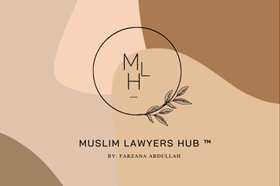Muslim Lawyers’ Hub is an organisation dedicated to increasing the number of Muslim lawyers in the UK. The aim is to help Muslim law students and young legal professionals gain access to the legal profession, which can often be a challenging and competitive field to enter.

Despite the Muslim community making up a significant proportion of the UK population, there are only 5% of Muslim Lawyers in the UK (no change since 2019). One of the main factors is the difficulties Muslims face in accessing the legal profession and feeling confident in their workplace. Four main areas of importance for Muslims are religious accommodation, networking & mentorship, representation, and education.
Firstly, religious accommodation including availability of prayer spaces, flexibility for prayer times, and accommodation of religious holidays and observances. Salah is the second of the Five Pillars of Islam. It is the belief that Muslims should pray five times each day. Prayer is important as it allows Muslims to communicate with Allah, listen to Allah and follow in the footsteps of the Prophets. Islam has two official holidays: Eid Al-Fitr and Eid Al-Adha. The former is celebrated at the end of the month of Ramadan, whereas Eid Al-Adha lands on the 10th day of Dhu al-Hijjah (the final month of the Islamic calendar). Being able to pray at work and have religious holidays, means Muslim colleagues can feel included and truly welcomed at the workplace. Not having access to a quiet space for prayer and time off for religious festivities means that Muslim professionals often find it difficult to balance their professional and religious needs, causing stress and pressure.
Secondly, networking and mentorship opportunities are important in every profession, especially so in the legal profession as these events act as a way to improve connections within the team, attract clients, and provide support, and guidance. However, Muslim professionals and aspiring professionals can often be left out of these events due to the nature of the event being based around alcohol. Drinking alcohol is considered haram, or forbidden, in Islam. Although these events may offer non-alcoholic drink options, these are often very limited, and many Muslims still feel uncomfortable in these environments. This leads to them being unable to attend such events and reaping the benefits which can prove useful for interviews and promotions.
Thirdly, the lack of representation because of the above statistics can often make minorities feel excluded and alienated. Aspiring lawyers may be discouraged due to not seeing many people like them achieving their aspirations of becoming a lawyer, as well as attaining more senior positions. Representation matters as it provides role models and a way of gaining greater insight into what working as a Muslim in a legal firm is truly like. Although there are a wide range of D&I events taking place targeted at students, there remain very few opportunities for students to be able to interact with Muslim professionals and ask questions.
Lastly, Muslim legal professionals face unique challenges in overcoming stereotypes and biases based on their religious identity. It is crucial to address these challenges and promote inclusivity within the legal profession. Furthermore, promoting education and awareness about Islam, Muslim culture, and the experiences of Muslim legal professionals can help dispel stereotypes, increase understanding, and foster an inclusive legal environment.
Muslim Lawyers’ Hub is working to address these issues by creating a network of Muslim legal professionals who can help support and guide Muslim students who are interested in pursuing a career in law. Muslim legal professionals can also interact with each other and network. By connecting these individuals with established Muslim lawyers, the organisation is helping to create a more diverse and inclusive legal profession.
The organisation has already made a significant impact in the legal community, with over 6,000 members across Instagram and LinkedIn. Muslim law students and young legal professionals have praised the organisation for its support and guidance, with one member stating that 'it brings an important discourse to social media, the legal profession, and wider society in the UK.'
In a world where diversity and inclusion are increasingly important issues, Muslim Lawyers’ Hub is playing its part in creating a more equitable society. By providing a support network for Muslim law students and legal professionals, the organisation is helping to break down barriers and create opportunities for individuals who might otherwise be overlooked.
Farzana Abdullah is a law student and founder of the Muslim Lawyers’ Hub






























